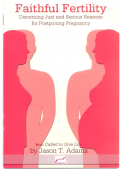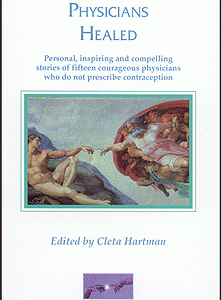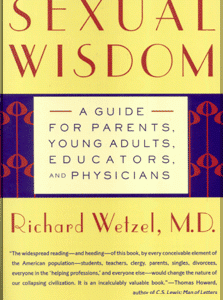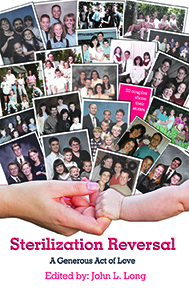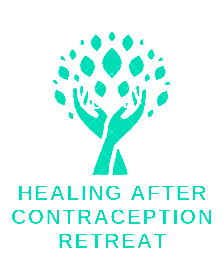A booklet version of this publication is also available. You may print and distribute this freely provided that it is printed without alteration.
How should a couple discern “just” and “serious” reasons for postponing pregnancy?
Intentions and Motivation
Spouses are called to have children, as children are the “supreme good” of married life (CCC 1664). However, there is no obligation to have as many children as physically possible without consideration of circumstances. Rather, the Church teaches that procreation may be regulated under certain conditions:
For just reasons, spouses may wish to space the births of their children. It is their duty to make certain that their desire is not motivated by selfishness but is in conformity with the generosity appropriate to responsible parenthood. Moreover, they should conform their behavior to the objective criteria of morality (CCC 2368).
Those are also to be considered responsible who for serious reasons [seriis causis] and with due respect for moral precepts, decide not to have another child for either a definite or an indefinite amount of time.1
The Church provides some guidelines for determining when it is moral to have children and when it is moral to postpone or cease having children. The decision must be considered in light of the Christian virtues of self-donation, charity, and prudence. Self-donation and charity, which are so closely related as to be practically synonymous, demand that the decision to have children consider first and foremost the good of the children (both existing and future), that is, a selfless appraisal of the intrinsic value of another child and his/her welfare, as well as proper concern for children already born. Prudence calls us to make wise and responsible decisions in service of charity and guides charity to its most fruitful end.
It is neither prudent nor charitable to have more children than a couple can reasonably care for. Indeed, Karol Wojtyla (John Paul II) teaches in his book Love and Responsibility that the prudent exercise of the gift of procreation is part of responsible parenthood:
There are, however, circumstances in which this disposition [to be a responsible parent] itself demands renunciation of procreation, and any further increase in the size of the family would be incompatible with parental duty. A man and a woman moved by true concern for the good of their family and a mutual sense of responsibility for the birth, maintenance, and upbringing of their children, will then limit intercourse and abstain from it in periods in which this might result in another pregnancy undesirable in the particular conditions of their married life and family.2
Specific Criteria
Humanae Vitae teaches that there are four factors that must be weighed in order to make a prudent decision to procreate: physical, psychological, economic, and social (HV 10). While there is no checklist of specific criteria formulated by the Church for these factors, we can reasonably identify the more obvious points. Danger to the physical well-being of the mother and/or child, inability to physically provide basic care for children, severe mental disability that makes responsible parenthood impossibleall of these could be serious or just reasons for postponing children. Economic factors might include an inability to provide for the basic needs of the children (e.g., food, shelter, clothing, safe environment, adequate education, medical care), serious marital instability, spousal abuse, gross lack of spousal support, and unemployment, to name a few, while social factors would include such things as compulsory limits to family size.
These more obvious criteria may not describe the situation of many couples, in whose case the decision to procreate is a clearer calling and obligation though not without some degree of ambiguity and moral deliberation. In these cases it might be more helpful to identify what could be considered invalid or selfish motives for the postponement of children. Loss of free time, sense of lost youth, cramped social life, inconvenience, change in sex life, inopportune timing, distaste for babies bodily functions (diaper changing, spit-up, slobber, crying, etc.), and materialism (inordinate attachment to material possessions), arguably all fall short of the standard of just or serious reasons.
The Second Vatican Councils Pastoral Constitution on the Church in the Modern World also offers some criteria for discerning the call to have children:
Parents should regard as their proper mission the task of transmitting human life and educating those to whom it has been transmitted. They should realize that they are thereby cooperators with the love of God the Creator, and are, so to speak, the interpreters of that love. Thus they will fulfill their task with human and Christian responsibility, and, with docile reverence toward God, will make decisions by common counsel and effort. Let them thoughtfully take into account both their own welfare and that of their children, those already born and those which the future may bring. For this accounting they need to reckon with both the material and the spiritual conditions of the times as well as of their state in life. Finally, they should consult the interests of the family group, of temporal society, and of the Church herself. The parents themselves and no one else should ultimately make this judgment in the sight of God. But in their manner of acting, spouses should be aware that they cannot proceed arbitrarily, but must always be governed according to a conscience dutifully conformed to the divine law itself, and should be submissive toward the Churchs teaching office, which authentically interprets that law in the light of the Gospel. That divine law reveals and protects the integral meaning of conjugal love, and impels it toward a truly human fulfillment. Thus, trusting in divine Providence and refining the spirit of sacrifice, married Christians glorify the Creator and strive toward fulfillment in Christ when with a generous human and Christian sense of responsibility they acquit themselves of the duty to procreate. Among the couples who fulfill their God-given task in this way, those merit special mention who with a gallant heart, and with wise and common deliberation, undertake to bring up suitably even a relatively large family (GS 50).
The council urges that spouses balance the “duty” to procreate with their state in life, the welfare of their existing and future children, as well as the needs of the Church and the world. Their discernment should be filled with the spirit of sacrifice and trust in divine providence. The concrete, practical living out of these ideals requires us to take stock of our priorities and consider what is really important in life. Our Lord taught, “seek first the kingdom of God and his justice, and all these things shall be given you besides” (Mt 6:33). Every good in our lives hinges on our relationship with God, whether the good is material means, personal fulfillment, or companionship. If we fail to embrace the call of God by rejecting the goods with which he has endowed marriage, the things that we try to put in place of these goods are emptied of their significance. Pitting our plans against Gods can never lead to fulfillment. Trusting in Gods providence in the spirit of sacrifice places our desires at the disposal of God with the confidence that He knows what is best for us and will never stop caring for us.
Getting Your Ducks in a Row
A serious decision of conscience such as this requires prayerhonest, deep, and persistent prayer. Guidance from priests, NFP couples, holy friends and family, books, tapes, and videos help provide direction and conscience formation. Cutting costs, living more simply, and reprioritizing our material desires, can help eliminate financial obstacles to choosing parenthood or a larger family. A couple should do everything they can to make a truly informed choice based on the objective norms for marriage and procreation revealed in the Church. A well-founded decision would involve at least the following three elements: 1) consulting the official teaching of the Church, 2) prayer and soul-searching, and 3) advice of Church authorities. To make such an important decision without these would be seriously negligent.
Because marriage, by its very nature, is ordered to the procreation and education of children (CCC 1652), spouses have a responsibility to steer their circumstances, over time, in the direction of having children. Excepting the rare cases of spouses who are physically, psychologically, economically, or socially incapable of caring for children, spouses are called to actively plan their lives for the eventuality of having children. Steps must be taken to facilitate openness to life in attitude and circumstance even if the couple has chosen to take some time to think about it. Couples who neglect these stepsprayer, inquiry, introspection, financial self-controlhave never really entered the realm of conscientious deliberation but may have a priori closed themselves to new life.
Listening to Our Bodies
Natural Family Planning opens the door for couples to listen to their bodies in the discernment of whether to welcome or postpone children. The desire for the marital embrace can not be reduced to a purely physiological impulse. Rather, it is properly understood as a divinely crafted inclination that harmonizes physical desire with actual grace (divine prompting toward some good). In other words, the sexual impulse toward our spouse is a means of divine suggestion. If we are constantly and indefinitely denying attraction to our spouse, we may need to consider (prayerfully weigh the possibility in consultation with ones spouse) relaxing the rules for the postponement of children and take some chances, realizing that children are often a greater blessing than we can ever imagine.
It is a mistake to expect the will of God to manifest itself like a lightning bolt from heaveninfusing certain knowledge of Gods willwhile ignoring the more ordinary channels through which God communicates. God speaks to us through our sexuality, and these urges created by God also respond to His providential guidance. This is not to say that we are slaves to our natural impulses. As rational creatures, we cooperate intelligently with the creator in the choices we make. The presence and timing of attraction toward our spouse is not an automatic mandate from God that we must have children, but it helps us discern whether we will accept the vocation of parenthood, or the invitation to be open to another child.
Discerning the Call to Parenthood in the Larger Context of Faith
Like all moral decisions, the choice of whether to have a child is affected by the overall condition of our faith. The best way to prepare for such a life-changing decision is to (1) embrace the baptismal call to holiness in youth, (2) exercise sound judgment in choosing a spouse, (3) avoid premarital sex and cohabiting relationships in favor of loving and communicative relationships, and (4) develop the obedience of faith wherein we submit ourselves completely to the will of God.
Marriage preparation, seen in this light, begins in childhood. In fact, the Pontifical Council for the Family teaches that education in the meaning of marriage actually begins before birth in the atmosphere in which the new life is awaited and welcomed as a gift.3 Parents, priests, and youth ministers are obliged to model obedience, chastity, prayer, and openness to new life across the various ministerial settings. Attitudes are formed in our youth that determine our receptiveness to the Churchs teaching on contraception, NFP, and the blessings of children in our adult years. Those responsible for the formation of youth have a responsibility to actively structure the dating attitudes and practices of young people so they learn early the real meaning of love as mutual self-donation, not mutual gratification. This type of formation conforms our will to Gods will, which remains always open to love and life. This more comprehensive approach will help eliminate the “loophole morality” that seeks the minimum number of children a couple is “required” to have and helps open marriages to the blessings of children and to the possibility of a large family. The fertility of marriage is not a numbers game but abandonment to Gods plan of joyous spousal love and the flourishing of new life.
A Personal Note
New life is what this whole process of discernment is all about, although it gets obscured sometimes in our discernment of the legal/moral obligations of marriage and parenthood. In the end life is the weightiest of all the criteria for discerning the call to parenthood. After all, life is the good which parenthood serves. This was brought home to my wife and me in the birth of our first child. For all the soul searching, study, discussion, and anxiety that accompanied our decision to have children, nothing convinced us more that parenthood was Gods call for us than when we embraced our new little baby boy. Once he came into our lives, there was never a second thought about whether we had made the right decision.
We planned for the birth of our first child first by relaxing the rules of NFP for postponement of children. As we did this our openness to children increased, until eventually we began actively and intentionally using the fertile times to achieve pregnancy. I firmly believe that once we allowed God a glimmer of access to our wills, he infused us with the desire to have children. Time and time again we have found ourselves wondering what all the worry was about as we enjoy our life as parents. Even though we have never worked harder or sacrificed so much, we have never felt more fulfilled and we have never been happier. Our children are an unfathomable gift from God of which we feel unworthy.
Once I worried about what I would have to give up in having children; now I know there is nothing that I would not give up for my children. They are infinitely more valuable to me than anything I own. They have deepened my love for my wife, and they have improved the way I spend my time. I see that I am a better person now than before, and that my potential is more fully realized because of this gift. We may have less disposable income, but we have learned to live happily on less. Simpler living has revealed to us just how much money we used to waste; parenthood has made us better stewards.
The bottom line is that all of my concerns about having children were obliterated the moment our son was born. We now have two beautiful children and hope to have more. The future growth of our family is still a subject of much prayer and discussion, but with far less anxiety and trepidation, because we have learned firsthand just how blessed parenthood can be. We are living life to the fullest, entrusting our family and our future to God.
Some Final Words on Discerning Parenthood
The final word on discerning parenthood is that there is no final word on discerning parenthood. It is tempting to want or demand a definitive checklist for making a decision, a kind of flowchart that produces a quick and certain answer to a complex question. The Church is clear on the responsibility of spouses to remain open to children and to avoid illicit means of postponing them (i.e., contraception). But the application of these norms may be more fluid than we would like them to be. We like clear and simple answers to questions, but we are not going to find one here. While the call to marriage is by its nature a call to parenthood, the choice of when to begin having children or whether to have another child should be worked out in prayer, honest communication among spouses, and good counsel from holy people, in light of the Churchs objective moral teachings on the goods of marriage and the conjugal union. There is pressure from both ends of the spectrum on this issue. Those with a so-called “contraceptive mentality,” or worse, those who ignore the issue altogether, want to deny the marital call to parenthood entirely in complete rebellion toward the meaning of marriage and the teaching authority of the Church. Spouses who pursue children with the attitude that more is always better without considering the impact on their family often put pressure on others to pursue parenthood without discernment or forethought. Both of these views polarize and complicate the discernment process unnecessarily. There simply is no one-size-fits-all approach to this issue because no two marriages or families are the same. Objective norms can be taught and reiterated, reasonable parameters can be set to help guide the process by ruling out frivolous reasons for postponing children, and methods of facilitating openness to children can be suggested. But the interplay between the human conscience and the truth that binds it is too subtle and complex to neatly wrap up in one fell swoop.
To those who are frustrated with the lack of definition in the discernment process, consider this distinction. When the moral decision facing us involves the prohibition of an intrinsic evil, such as abortion, our choice is unambiguouswe may never commit abortion under any circumstances. If we, by a positive act of the will, commit an action that is intrinsically evil, we have done wrong. When the moral decision facing us involves whether, or to what extent, we are to perform some positive good, the choice is less clear. For example, going to Mass is a morally good choice to which I am obligated every Lords Day. Does it then follow that I decide against this good [the Mass] if I dont go every day? Is it the case that if it is good to go to Mass, then I have sinned against this good if I dont go at every given opportunity? It is good, moreover, to adore the Blessed Sacrament because it is the Real Presence of Christ. Have I done wrong, if knowing this, I dont spend every waking moment in front of the Tabernacle in prayer?
Apply these scenarios to the discernment of parenthood. The choice to contracept is an intrinsically evil act, the willful commission of a prohibited deed, and is therefore clearly wrong. When our choice is whether to have children, when to have them, or whether to have more, it is not a matter of prohibition but of the commission of a good deed. Children are intrinsically good, but does this mean that if I dont have as many as possible I am sinning against this good? I am not obligated to have as many children as physically possible any more than I am obligated to attend Mass or to visit the Blessed Sacrament as many times as physically possible. The standard that I must follow in deciding to promote these goods is generositygiving all I can to promote a good prudently. You can see how this standard would be different for different people in different states of life. This is where the fluidity of discerning parenthood is revealed. Like the commission of any other good, we must determine our obligations insofar as they serve the good we want to promote.4 Getting involved in parish ministries, for example, is good; but it ceases to be good if in doing so I neglect my children, my wife, and the career with which I support them. Likewise, having children is good, but if we have more than we can support, we endanger the welfare of all our children and compromise the stability of our marriage. The generous approach is, in the former example, to involve myself in parish ministry as much as I can without compromising my family and career. In the latter example, I am generous when I have as many children as I can without compromising the welfare of my existing children and the stability of my marriage.5
Keeping Our Objectivity
It is wise at this point to reiterate that we must always abide by the objective teaching of the Church that children are a natural end of marriage and that the conjugal act must always remain open to new life. This is why the Church upholds the standard of serious or just reasons for the postponement of procreation. In the absence of these reasons it is understood that couples would not try to limit their acts of intercourse to the infertile periods. That the choice to not impede having children takes into consideration certain circumstances does not make it a purely subjective matterthe couple must make their choice within the bounds of the Churchs authoritative teaching.
It is our duty to apply the objective standards of married life to our discernment of parenthood as best we can, utilizing (1) input from authorities loyal to the teaching of the Church, (2) our prayer life, (3) the grace of the sacraments, (4) input from faithful couples, and (5) communication between spouses. Availing ourselves of all of these resources maximizes Gods input on the matter, which is what will ultimately give us the answers we seek. We will be spared a lot of anxiety if we remind ourselves that God knows we are not infallible, and he does not expect an infallible decision from us on this matter. God does not say to us, “I will cooperate with you to bring about new life, but if you get it wrong I will smite you!” Gods will is solicitous more than it is demanding. Of course, his will is certain and immutable but he brings us to his will as a teacher and loving father. It seems inconsistent with the nature of God that he would want us to be fearful or anxious over the decision to have children. On the contrary, it seems more likely that God would like us to see the decision to have children the same way we might see a decision about who we will marryexciting, full of expectation, hopeful, and passionate. The only way our discernment of parenthood will be these things to us is if we love our spouse generously and allow God into the discernment process in every way possible.
It follows that family life ministers and/or other teachers of the Churchs vision for marriage and family life explain not only the harm of contraception and the blessings of children, but that they offer couples friendly guidance about whether, when, and how large to make a family. It is not fair or wise to offer teaching in the methodology of NFP during marriage preparation and then to forget about these couples. NFP is an essential part of marriage preparation and follow-up is equally essentialit is more than a method; it is a ministry that is ongoing. Dioceses/parishes need to provide open-ended support and direction for couples trying to decide whether they want to begin or expand families. Parishes can conduct workshops, retreats, and days of recollection that specifically address this issue, wherein couples learn the Churchs wisdom on the issue and are given a variety of opportunities to examine themselves:
1. Meetings with seasoned parents who can articulate their experience with the discernment process and their experience as parents;
2. Time alone to discuss with each other where they are on the issue of openness to children;
3. Instruction on financial considerationsliving more simply and avoiding materialism;
4. Explanation of how to make prayer part of the decision-making process;
5. Discussion of appropriate and inappropriate criteria for postponing children;
6. Offering a Parenthood Support Group in the parish that will help couples who have decided to pursue achieving pregnancy.
Conducting events like these is easier than it might seem. NFP couples are usually more than willing and capable to help with this type of projectall it would take is a few motivated couples to make it work.
Couples who know they have the support of friends are much less anxious about the prospect of having children. Making a big decision alone is scary, but is less frightening when made with the help of trusted advisors. Parishioners will be much more open to children if they feel they dont have to go it alone. When the parish is seen by married couples as a support network that will welcome and nurture their childrenas well as provide a helping hand in their upbringing and formationthey will be encouraged to begin or expand their families. Yet parents are not the only ones to benefit from this kind of support. Vibrant, loving families are a wellspring of renewal for the parish and the whole Church. It is hard not to notice that parishes with an atmosphere of vitality and enthusiasm, parishes that are growing and reaching out to others, are full of robust families. We can see that the parish community is an essential partner in the discernment process of spouses, providing guidance, practical support, and an environment in which the gifts of the family bear fruit for the whole family of God.
About the Author
This booklet is drawn from Part 3 of Called to Give Life by Jason T. Adams. Jason Adams is a father of five and the Theology Chair at Guerin Catholic High School, Noblesville, Indiana. He serves as Outreach Associate for One More Soul, the publisher of Called to Give Life. He holds the degrees of Bachelor of Arts, in Secondary Education, from Purdue University, and Master of Arts, in Theology and Christian Ministry, from the Franciscan University of Steubenville. Jason and Linda have used Natural Family Planning to successfully postpone and achieve pregnancy throughout their marriage, and have shared their testimony to its benefits in Pre-Cana, RCIA, young adult/youth groups, and other venues.
Foot Notes
1 HV 10, Trans: Janet E.Smith, PhD. St Martin de Porres Press, New Hope, KY.
2 Love and Responsibility. Ignatius Press. San Francisco: 1993, p. 243.
3 Preparation for the Sacrament of Marriage 23
4 See Called to Give Life, p. 31 for a treatment of the relationship between conscience and objective moral norms. See also Veritatis Splendor 59.
5 See Veritatis Splendor 52 for further discussion of moral prohibitions versus the obligation to do good.
